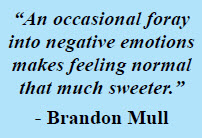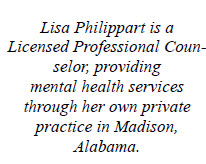 By: Lisa Philppart
By: Lisa Philppart
I am often asked as a therapist: “How do you sit there and listen to people’s problems all day…. don’t you get depressed?” Actually, I don’t. While you might imagine that all the sadness, frustration, and anxiety from my clients might start to rub off on me, it really doesn’t. In fact, if anything, I feel I’m better at managing both my own and others’ emotions because I’m forced to practice all day long as a result of my job. In the next few paragraphs, I will share some specific skills that help me to effectively handle other people’s difficult emotions.
When someone close to us is struggling with heavy emotions, it’s natural to see these emotions as problems, something to be taken care of right now…which is why we so often turn to advice-giving. But, as I’m sure you have learned, giving advice to someone who is emotionally overwhelmed is unhelpful at best, and usually counterproductive. So instead of seeing these emotions as problems, what if you shift the perspective slightly and try to see them as puzzles? Thinking of problems as puzzles puts you into the mindset of curiosity. And when you are curious about another person’s emotions, it’s far easier to be validating, understanding, and empathetic. Here is how the thought shift would work: rather than thinking, “Don’t they see this isn’t doing them any good?” substitute a curiosity question like, “What could be going on with them to lead to so much painful emotion?”
 Empathy is the act of putting yourself in someone else’s shoes, imagining what it must be like to live with their thoughts, feelings, and experiences. One way to manage other people’s bad moods is called reverse empathy. Instead of putting yourself in their shoes, try to remember a time when you wore the same shoes. For example, if someone is really frustrated, think back to a time when you were upset…. What happened to get you angry? What did people around you do? What do you remember wanting or needing when you felt that way? The more you can relate yourself to what this person is going through, the better your odds of being genuinely helpful or supportive to the person next to you, not to mention, being less reactive and emotional yourself.
Empathy is the act of putting yourself in someone else’s shoes, imagining what it must be like to live with their thoughts, feelings, and experiences. One way to manage other people’s bad moods is called reverse empathy. Instead of putting yourself in their shoes, try to remember a time when you wore the same shoes. For example, if someone is really frustrated, think back to a time when you were upset…. What happened to get you angry? What did people around you do? What do you remember wanting or needing when you felt that way? The more you can relate yourself to what this person is going through, the better your odds of being genuinely helpful or supportive to the person next to you, not to mention, being less reactive and emotional yourself.
 Without a doubt, the number one mistake I see people (especially couples) make in their communication with each other is that they get stuck in “fix-it” mode. For example, your friend feels bad and starts describing how he feels and why he feels that way. Because you see that your friend is in pain and struggling, your natural reaction is to try alleviating or eliminating your friend’s suffering. Here’s my suggestion: often people who are struggling emotionally don’t want someone to fix the problem, they want to feel understood. So how do you get out of the fix-it mindset and start helping people feel understood? Try being a mirror, not a mechanic. The best way is to practice a technique called reflective listening. When someone tells you something, you simply reflect back to them what they said, either literally or with your own slight spin on it. For example, your friend says, “I can’t believe my boss humiliated me like that in front of the whole staff.” You would respond with, “Sounds like you were really embarrassed.” Now this might sound silly or condescending, but this works because it’s not about the content of what your friend is saying, it’s about how they feel. The value of reflective listening is that it helps others feel like you are with them, that you are connecting and understanding.
Without a doubt, the number one mistake I see people (especially couples) make in their communication with each other is that they get stuck in “fix-it” mode. For example, your friend feels bad and starts describing how he feels and why he feels that way. Because you see that your friend is in pain and struggling, your natural reaction is to try alleviating or eliminating your friend’s suffering. Here’s my suggestion: often people who are struggling emotionally don’t want someone to fix the problem, they want to feel understood. So how do you get out of the fix-it mindset and start helping people feel understood? Try being a mirror, not a mechanic. The best way is to practice a technique called reflective listening. When someone tells you something, you simply reflect back to them what they said, either literally or with your own slight spin on it. For example, your friend says, “I can’t believe my boss humiliated me like that in front of the whole staff.” You would respond with, “Sounds like you were really embarrassed.” Now this might sound silly or condescending, but this works because it’s not about the content of what your friend is saying, it’s about how they feel. The value of reflective listening is that it helps others feel like you are with them, that you are connecting and understanding.
In my next article, I will offer two more suggestions to better manage others’ negative emotions.
By: Lisa Philippart
Licensed Professional Counselor










 June 20, 2025
June 20, 2025



